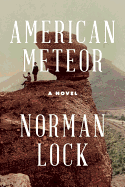
| Publisher: | Bellevue Literary Press | |
| Genre: | General, Fiction, Historical, Westerns, Literary | |
| ISBN: | 9781934137949 | |
| Pub Date: | June 2015 | |
| Price: | $15.95 |
| Starred | Fiction |
by Norman Lock
Veteran writer Norman Lock (The Boy in His Winter; Love Among the Particles) follows the life of the directionless Stephen Moran, from his role as a 16-year-old bugler for the Union Army during the Civil War to footman on the Transcontinental Railroad and official George Custer photographer during the Battle of Little Bighorn. In the early 20th century, Moran colors his first-person narrative with anachronistic anecdotes of a future that comes to him in the dreams Chief Crazy Horse bestowed upon him like a curse.
What's most striking about American Meteor is how swiftly, efficiently and sometimes callously it distills the United States's history of violence into one or two lyrical sentences. After surviving the Civil War, Lock's jaded narrator spends a season among the Ute Indians of Utah and says, "The Indians believed they inhabited an endless ribbon of time. Ten thousand years on the Great Plains had done nothing to disabuse them. It took us whites just twenty-five years to show them they were wrong."
This is what Moran is most fascinated by: What are humans capable of doing to one another in the pursuit of destiny? In this story, populated both by historical figures and metaphysical entities, the country's destiny is equal parts unspeakable evil and transcendent love.
In this way, the novel moves beyond historical fiction. While Abraham Lincoln, Ulysses S. Grant and Walt Whitman all make appearances in it, American Meteor is, at its core, a spiritual treatise that forces its readers to examine their own role in history's unceasing march forward. --Josh Potter
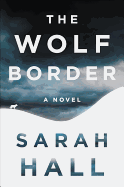
| Publisher: | Harper | |
| Genre: | General, Fiction, Literary | |
| ISBN: | 9780062208477 | |
| Pub Date: | June 2015 | |
| Price: | $25.99 |
| Fiction |
by Sarah Hall
Rachel Caine is a zoologist who has spent the past 10 years studying wolves on the Nez Perce Reservation in Idaho. Although born and raised in England, she considers the United States her home, but when the Earl of Annerdale offers her a job coordinating the reintroduction of wild wolves into the Lake District, near her childhood home, she moves back to England to tackle this new and exciting project.
What unfolds in Sarah Hall's descriptive prose is a wonderful tale of humans interacting with wild animals, humans engaging with other humans, and the emotional ups and downs that can ensue when various combinations of animals and humans clash. Rachel must deal with the extremely wealthy gentry and their assorted staff, those who oppose the idea of bringing predators back into the region and her own interactions with her long-estranged brother and mother as she readjusts to English ways of life and its weather. Hall's extensive research into wolf behavior is evident throughout as she writes lovely short passages such as, "They cover the open moor in less than a minute. One dark, one light, stellar and obverse, their hind muscles working sumptuously under their coats."
Hall (The Electric Michelangelo) has also built in a subplot based on contemporary events in Scotland and the country's desire for independence, which adds to the story. Hall has written a novel that is lyrical, earthy and emotionally moving. --Lee E. Cart, freelance writer and book reviewer
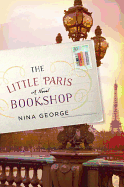
| Publisher: | Crown | |
| Genre: | Psychological, Fiction, Romance, Contemporary, Literary | |
| ISBN: | 9780553418774 | |
| Pub Date: | June 2015 | |
| Price: | $25 |
| Fiction |
by Nina George, trans. by Simon Pare
Nina George's enchanting The Little Paris Bookshop deals with the nature of grief and the power of friendship, love and truth. The narrative centers on 50-year-old Monsieur Jean Perdu, who owns a bookstore called the Literary Apothecary--actually a floating barge "the length of three truck trailers" that houses 8,000 books, moored on the Seine. Perdu lives at 27 Rue Montagnard and is a passionate bibliophile who believes that booksellers don't just look after books, they look after people.
Things take a turn when two new residents move into Rue Montagnard. Max Jordan is a young author whose debut novel has made him famous, but he is plagued with writers' block. The other new neighbor is Madame Catherine, who moves into the flat across the hall from Perdu. The tenants of the building rally to help this newly cast-off wife who has nothing of her own to set up her new apartment.
Perdu delivers a table to Madame Catherine's apartment, and she discovers a letter hidden inside that causes Perdu's head and heart to spiral into an emotional tailspin. He takes refuge in the Literary Apothecary, soon hauling anchor and setting sail--but not before Max, who's being pursued by paparazzi, jumps aboard the moving barge.
George is a lyrical writer whose beautiful, sensory language and imagery enhance this adventurous, moving narrative. On their voyage, the men are frequently mistaken for father and son, and they pass the time by sharing life stories. In the end, their excursion propels Perdu to finally reconnect with himself--the person he was, is and who he will become in the future. --Kathleen Gerard
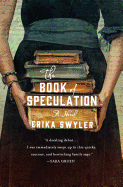
| Publisher: | St. Martin's Press | |
| Genre: | Fiction, Sagas | |
| ISBN: | 9781250054807 | |
| Pub Date: | June 2015 | |
| Price: | $26.99 |
| Fiction |
by Erika Swyler
Erika Swyler's debut novel, The Book of Speculation, opens on a precipice: Simon Watson's house teeters, ready to tumble into the sea. Simon is employed as a librarian, and lacks the funds to shore up his family home. His mother drowned, his father died from grief, and his sister, Enola, left to be part of a traveling carnival. She happens, though, to be on her way home when Simon receives a strange package in the mail: a very old book believed to be related to their family history.
Simon discovers a disturbing pattern in the book. Simon already knew his mother was a "mermaid": she could hold her breath for many minutes at a time. This skill notwithstanding, she drowned herself on a 24th of July. Simon did not know, however, that she came from a line of circus-performing mermaids, and that they all died by drowning on that same day. In mid-July, as Enola, acting strangely, has returned to their home by the sea, Simon fears that time is running out if he hopes to solve this puzzle and save his sister.
The Book of Speculation is driven both by character and by plot in delightful, mesmerizing prose. The meandering story offers quirky librarians, circus menageries, love stories, tarot cards, mysticism, family secrets and prickly sibling love--all accompanied by the author's illustrations. [Swyler also painstakingly hand-bound, gilded and aged her manuscript submissions, in imitation of the old book in her story.] In short, The Book of Speculation, like the book at its center, promises to grasp the reader with a supernatural force and not let go. --Julia Jenkins
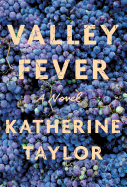
| Publisher: | Farrar, Straus & Giroux | |
| Genre: | Fiction, Literary | |
| ISBN: | 9780374299149 | |
| Pub Date: | June 2015 | |
| Price: | $26 |
| Fiction |
by Katherine Taylor
A broken romantic relationship propels a disillusioned young woman back to her hometown of Fresno, Calif., in Katherine Taylor's vivid, enjoyable second novel, Valley Fever. This story of family, friendship, loyalty and betrayal is narrated by sharp-witted, 30-something Ingrid Palamede, who settles into the colorful backdrop of the Central Valley and her family's faltering 20,000-acre riverside vineyard--Palamede Farms. The vineyard has a storied history; Ingrid's father, Ned, inherited his first hundred acres and, over the years, kept buying and cultivating more land. But the farm is now in financial trouble, Ned is ill and Ingrid's mother is contemptuous. With plenty of free time now, Ingrid offers to help. Is she the savior the farm needs?
As she becomes embroiled in the small-town landscape that shaped her, Ingrid revisits her past, brushing up against an old flame, an estranged best friend and an employee suspected of stealing from the farm. Ingrid's sister, Anne--a successful voice-over actress in Los Angeles who would do anything for her--is leery about Ingrid's plight. And then there's "Uncle" Felix, Ned's oldest and dearest friend, another vintner, who makes his living by purchasing grapes from other farmers--including the Palamedes. With Ingrid in charge, will Felix hold up his end of the bargain, or will sour grapes and self-interest trump professional bonds?
Taylor (Rules for Saying Goodbye) delivers a vivid, bittersweet, entertaining drama that harvests ripe truths about self-discovery, the workings of the heart and the tangled vines of families and fortunes. --Kathleen Gerard, blogger at Reading Between the Lines
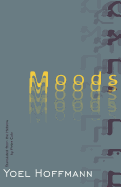
| Publisher: | New Directions | |
| Genre: | Jewish, Fiction, Literary | |
| ISBN: | 9780811223829 | |
| Pub Date: | June 2015 | |
| Price: | $15.95 |
| Fiction |
by Yoel Hoffmann, trans. by Peter Cole
In part 148 of Moods, Israeli author Yoel Hoffmann's (Curriculum Vitae) novel-cum-memoir, he describes automatic writing, wherein writers channel prose as if it came in an uninterrupted flow, divinely inspired. He quips, "Most likely at that very moment God felt a terrible sense of constriction." It's these asides, tacked onto paragraphs like a wry whisper from a neighbor at the dinner table, that give Moods its unconventional allure. Hoffmann's meditations span the universal to the particular, and amidst these terse, numbered sections, the reader is invited to marvel and laugh at the quotidian.
The intersection of ordinariness and awe recurs often here, a polarity that colors encounters such as the young narrator's rendezvous with a French prostitute. People die, crows perch and Hoffmann sees God--or his absence--in these daily goings-on. His lyrical, elliptical nods to depression are some of the book's most moving passages, as when he writes, "We too have trouble when it comes to finishing the month... feelings are always troubling our heart. The feeling of things past. Of sights. And things we've lost. Of night. We send up a prayer that we won't be so needy."
The book's one glaring flaw is its treatment of women. The author's invocation of a female psychoanalyst's "breasts hidden within her suit jacket like two stowaways" provides one example in which word choice seems poor, but these puzzling passages are fleeting. Stylistically innovative and emotionally powerful, Moods manages the rare feat of pinning ephemera onto paper. --Linnie Greene, freelance writer
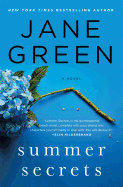
| Publisher: | St. Martin's Press | |
| Genre: | Fiction, Contemporary Women | |
| ISBN: | 9781250047342 | |
| Pub Date: | June 2015 | |
| Price: | $26.99 |
| Fiction |
by Jane Green
In Summer Secrets, Jane Green (Family Secrets; Saving Grace) peers inside the heart, mind and soul of a woman grappling with alcoholism and how that addiction pacifies and plagues every aspect of her life. The story is told by Cat Coombs, a sophisticated and self-aware, yet deeply flawed, Brit who looks at life from two crossroads: when she was 29 and as she nears the age of 40.
In her late 30s, 18 months divorced and in the process of rebuilding her life with the help of Alcoholics Anonymous, Cat is filled with regret. When she was 29, she was a single, free-spirited woman at the height of her career, working as a journalist for the Daily Gazette, a high-powered British fashion magazine. "Alcohol made me beautiful in a way I never felt the rest of the time," Cat admits. "It filled me with a confidence that had always been missing."
Green has written an impassioned, harrowing drama rife with betrayals, reversals and secrets. In chilling detail, she delves into the circuitous, emotional journey of a woman who is keenly perceptive yet sadly powerless to help herself. Cat's poor decisions and her self-destructive behavior may challenge some readers' affections. However, Green's well-rendered insights into Cat's flaws, imperfections and her interior alcoholic sensibility lend gritty realism that ultimately inspires empathy for Cat's character, a woman searching for a way to forgive herself and make amends with those she's hurt in the hope she can move beyond the regrets of her own dark past and step into a brighter future. --Kathleen Gerard

| Publisher: | Hogarth | |
| Genre: | Science Fiction, Fiction, Action & Adventure, Alien Contact, Literary, Visionary & Metaphysical | |
| ISBN: | 9780553418866 | |
| Pub Date: | June 2015 | |
| Price: | $17 |
| Fiction |
by Michel Faber
The Book of Strange New Things is a major work by an author who never repeats himself but continues to push the limits of cutting-edge literature. Michel Faber's novel about the spreading of the gospel in an alien world, and the possible end of our world, is also an exploration of a marriage in crisis and how faith and fidelity are tested in extremis.
Peter Leigh is a missionary recruited by the vaguely sinister multi-national corporation USIC to preach to the inhabitants of the recently discovered planet Oasis, lightyears away. Peter's wife, Bea, is left back on Earth--deemed unfit for the mission by USIC--where the situation becomes increasingly desperate, possibly apocalyptic. Bea's faith is being shaken while Peter is moving in the other direction with great success and emotional epiphanies in his evangelization of the Oasans. USIC's awareness of the Earth's precarious position adds a paranoid, Orwellian aspect to the novel.
Peter and Bea's solid, loving relationship is reduced to fumbling, intermittent communications on "the Shoot," a device that sends typewritten notes across the galactic distance, as the couple try to share diametrically opposed experiences--Peter reaching almost transcendent moments of euphoria with his Jesus-loving alien brethren; Bea, increasingly desperate and isolated back home as the world suffers a series of unprecendented natural disasters. Faber manages to convey the emotional rawness and sense of how a few wrong words can send a relationship hurtling into dangerous realms.
Faber, the author of the acclaimed Under the Skin and The Crimson Petal and the White, moves into new territory (literally) with The Book of Strange New Things. The speculative aspects of his novel are seamless, intriguing, thought-provoking and ultimately shocking. The Oasans are a fully realized species, and very other: "Here was a face that was nothing like a Face. Instead, it was a massive whitish-pink walnut kernel." They speak a limited English, with a soft, asthmatic sound-- "Where the 's's should have been, there was a noise like a ripe fruit being thumbed into two halves."--and Faber uses symbols to substitute for some common sounds. His description of the planet and its ecosystems have that touch of the odd and sublime that marks a great work of science fiction--on Oasis, even the rain is different: "They truly were rains, plural. Three colossal networks of water were advancing independently, separated by substantial spaces of clear air. Each network had its own internal logic, replicating and reassembling its glittering patterns over and over." The Oasans--already familiar with Christianity via a previous preacher who went missing--call the book Peter shares with them "The Book of Strange New Things."They never say the word "Bible," because " 'Power of the book forbid. Flame give warmth....' With outstretched hands, [the Oasan] mimed the action of warming oneself on a fire, getting too close and being burned." But they are eager to hear the "technique of Jesus." Why they are so keen, even desperate, is one of the surprises Faber has in store.
Faber describes Peter's interactions with his fellow USIC contractors who've been gathered at the utilitarian base, a group of odds and sods nearly as frustratingly opaque to him as the indigenous population. In particular, Peter develops a relationship with Grainger, a woman with seemingly no use for his faith, who has her own unresolved issues on Earth.
Faber manages to weave echoes of imperialism and "white man's burden" into the narrative without making Peter into a straw man of an over-zealous evangelist. Peter remains compassionate though naïve; he can misread situations, whether with his wife or the gentle Oasans to whom he ministers. Faber has given him the back-story of a bruiser and addict whose salvation came through Bea and her faith; it is one of the ambiguities of the novel that the reader wonders how much of his faith is rooted in wanting to please her and how much will remain of it if her faith is lost to her.
Bea's narrative of her domestic Armageddon is harrowing. The breakdown of Earth's infrastructure and the daily amenities that have become necessities are presented with clinical horror and compassionate skill. In Faber's version, the world will end with a bang and a whimper. Peter, increasingly absorbed in his alien world, is helpless in the face of Bea's increasingly dire situation.
Faber presents complex ideas and grand themes here with penetrating insight and he never once loses track of the story or lets it bog down in narrative detail. There are moments in this novel of such devastating truth that they are capable of wiping away old world views, scenes of such revelatory power and tenderness that they will stay with the reader for a long time.
The Book of Strange New Things is an unsettling, thought-provoking exploration of faith, love and redemption, deserving of a wide audience. --Donald Powell

| Publisher: | Random House | |
| Genre: | Veterans, United States, History, Military | |
| ISBN: | 9780553805185 | |
| Pub Date: | June 2015 | |
| Price: | $30 |
| Starred | History |
by Alexander Rose
Alexander Rose's third book on American history, Men of War: The American Soldier in Combat at Bunker Hill, Gettysburg, and Iwo Jima, is a work of considerable ambition. Focused on the day-to-day experience of American soldiers and the ways that it changed (or didn't) over time, Rose's book is heavily indebted to The Face of Battle, in which John Keegan "investigated the experience of the common British soldier--what he felt, heard, and saw--in three epic battles: Agincourt in 1415, Waterloo in 1815, and the Somme in 1916." Rose, whose second book, Washington's Spies, was adapted into the AMC television series Turn, adapts Keegan's template for American soldiers at Bunker Hill in 1775, Gettysburg in 1863 and Iwo Jima in 1945.
Because these battles have already been written about a great deal, Rose wisely spends only a scant few pages recapping them in the traditional, strategic sense. Then he barrels into the details of combat, re-orienting the reader's understanding of each conflict to a soldier's perspective using extensive quotations from contemporary letters and journals. The book brings to light both how much and how little has changed as military technology has progressed, with a special emphasis on the physical and psychic wounds endured by soldiers. Rose successfully emphasizes the human elements of war, investigating the seemingly mundane aspects of soldierly life with profoundly revealing results. Men of War is a worthy American successor to Keegan's masterpiece. --Hank Stephenson, bookseller, Flyleaf Books
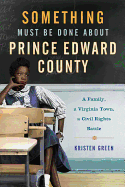
| Publisher: | Harper | |
| Genre: | United States, Education, State & Local - South, History, Social Science, 20th Century, African American, Discrimination & Racism | |
| ISBN: | 9780062268679 | |
| Pub Date: | June 2015 | |
| Price: | $25.99 |
| History |
by Kristen Green
Prince Edward County in Virginia played a notable, if shameful, role in the desegregation of schools in the 1960s: after the Brown v. Board of Education ruling, the county opted to close its public schools rather than integrate them. The schools remained closed for five years. While white parents founded the Prince Edward Academy for white students, black parents were left with few, if any, educational opportunities for their own children.
Kristen Green, a journalist, was born and raised in Prince Edward County, and attended Prince Edward Academy, which didn't accept black students until 1986. Reflecting on her all-white education and the lack of conversation about Prince Edward County's questionable place in the civil rights movement, Green started to dig into her hometown's history--and was shocked to learn of her own family's involvement in the closing of the public schools.
Because of Green's personal connection with the subject, Something Must Be Done About Prince Edward County is part memoir, part history. It is strongest when dealing with the latter, as she explores the political motivations, legal loopholes and emotional impact of closing the schools. "Progress," she writes, "is revisiting what happened here in a public way." Something Must Be Done about Prince Edward County, then, is the very definition of progress, offering an important and intimate look at a small town's history of injustice and how that has affected the community to this day. --Kerry McHugh, blogger at Entomology of a Bookworm
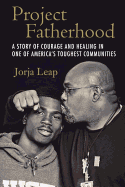
| Publisher: | Beacon Press | |
| Genre: | Fatherhood, General, Men's Studies, Ethnic Studies, Parenting, Social Science, African American Studies - General, Family & Relationships | |
| ISBN: | 9780807014523 | |
| Pub Date: | June 2015 | |
| Price: | $24.95 |
| Parenting & Family |
by Jorja Leap
Gang expert and policy advisor Jorja Leap (Jumped In) narrates the touching story of former gang members in Watts, Los Angeles, who come together to learn how to be fathers and end up changing their community. Leap, a petite woman of Greek descent, is recruited to the group--because of her master social worker status--by its founder, Mike Cummings, himself a former gang leader and now a community activist. Often told by the members that she doesn't understand because she's "not from the ghetto," Leap shows in Project Fatherhood that while she may not fully comprehend their experiences, she loves these men and takes enormous pride in their accomplishments.
At first, the African-American and Latino men reluctantly attend Project Fatherhood meetings, enticed by meals and gift cards. They share their stories and frustrations, discuss prescribed topics and begin to recruit others. The trust they build with one another enables them to reject a radical group's attempt to infiltrate the program, participate in community activism, and feel confident bringing their children so everyone can help them parent when they're overwhelmed by frustration. Finally, in an inspiring turn of events, the fathers decide to reach out and mentor the boys of their neighborhood. The students become the teachers.
For her part, Leap discovers the men are correct: there is a lot she doesn't grasp. But with their help, she learns, and Project Fatherhood is the primer for any who weren't lucky enough to receive the education first hand. Funny, hopeful, heart-warming and eye opening, Project Fatherhood has life-changing lessons for every reader. --Jen Forbus of Jen's Book Thoughts
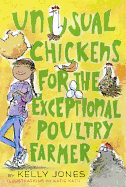
| Publisher: | Knopf | |
| Genre: | Farm Animals, Animals, Lifestyles, Farm Life & Ranch Life, Fantasy & Magic, Juvenile Fiction, Birds | |
| ISBN: | 9780385755528 | |
| Pub Date: | May 2015 | |
| Price: | $16.99 |
| Starred | Children's & Young Adult |
by Kelly A. Jones, illust. by Katie Kath
Debut novelist Kelly A. Jones introduces brave, highly intelligent and resourceful Sophie Brown, a 12-year-old poultry farmer in the making.
Jones takes readers into Sophie's world with a series of funny, insightful letters. Sophie's father has lost his job, prompting the family to leave Los Angeles and move to Gravenstein, Calif., where her recently deceased Great-Uncle Jim has left them a farm. While Sophie's father sends out his resumé and her mother writes articles, Sophie writes to Redwood Farm Supply in search of advice. Sophie also writes to her deceased Abuelita to confide her disappointment in her former best friend, and how she misses L.A. and dislikes the fact that there are "no brown people" like her and Mom. But Sophie also admits her fondness for Gregory the mailman and some potential friends in town. Sophie soon learns that Great-Uncle Jim had some chickens, and she begins to discover their whereabouts. She grows quite attached to them, and soon has another problem on her hands: Ms. Griegson keeps showing up with her orange pickup truck, trying to snatch Sophie's "unusual" chickens. Not wanting to lose the chickens or disclose their unusual qualities, Sophie keeps them secret from her parents, feeding and protecting them herself. Katie Kath, with spontaneous pen-and-ink and watercolor wash artwork that calls to mind Sue Truesdell's work, injects humor and emotion, while also informing readers with occasional drawings of various chickens.
Readers will hope for more from irrepressible Sophie and this talented author. --Jennifer M. Brown, children's editor, Shelf Awareness
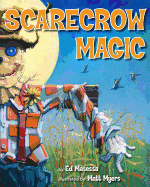
| Publisher: | Scholastic | |
| Genre: | Horror & Ghost Stories, Halloween, Imagination & Play, Holidays & Celebrations, Juvenile Fiction | |
| ISBN: | 9780545691093 | |
| Pub Date: | June 2015 | |
| Price: | $16.99 |
| Children's & Young Adult |
by Ed Masessa, illust. by Matt Myers
Ed Masessa (The Windmaker's Guidebook) and Matt Myers (Battle Bunny) imagine a double life for a straw man in this rollicking, goose-pimply picture book.
A full moon in autumn gets a scarecrow moving. "The magic is building. The ground comes alive./ Troublesome creatures begin to arrive." Myers portrays the scarecrow wearing a red-and-white plaid shirt with a matching patch on his jeans, button eyes (one brown, one blue), white gloves, a dilapidated straw hat and red hightops. When he loosens the ropes that bind him to his post, "he slips out of his skin," revealing a skeleton in polka-dotted boxers, diving into a pond. He's a happy fellow, belting out a tune as "ghoulies and ghosties dance under the moon." The spot-on rhyme scheme and haunting artwork nicely walk the line between creepy and funny: the looks of the goblins range from one that resembles a fir tree with a tail and glasses to another that looks like a bunny with an overbite. The nighttime denizens jump double-Dutch by the light of the moon and roll "round, knobby pumpkins" on a makeshift bowling lane with "long lumpy gourds" as their pins. There's just enough "ew" to please young readers ("A ghoul's favorite snack has the odor of feet"), and as the sun rises, the nighttime denizens begin to take cover, hiding evidence of their amusements as they go. "Back on this post, Scarecrow zips up his skin./ Fun time has ended Soon work must begin."
Author and artist suggest there's a time and place for work and play, and the fixtures we take for granted may well have a secret existence. --Jennifer M. Brown, children's editor, Shelf Awareness